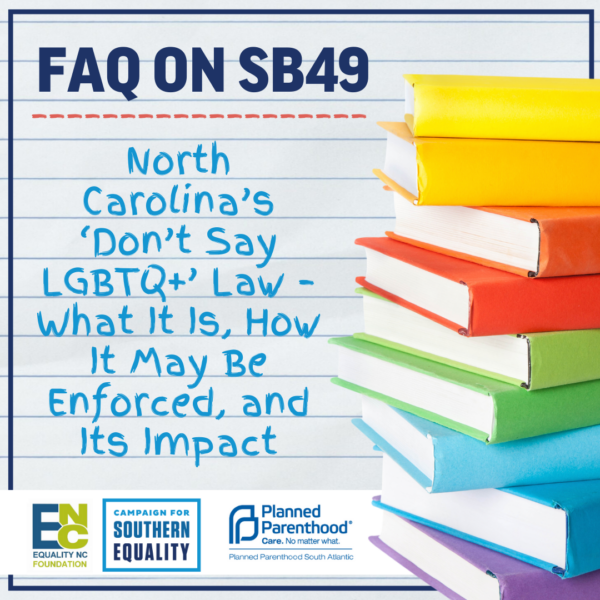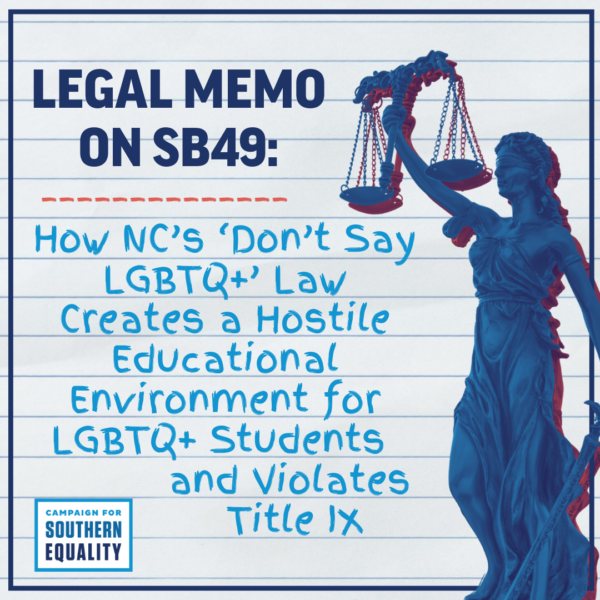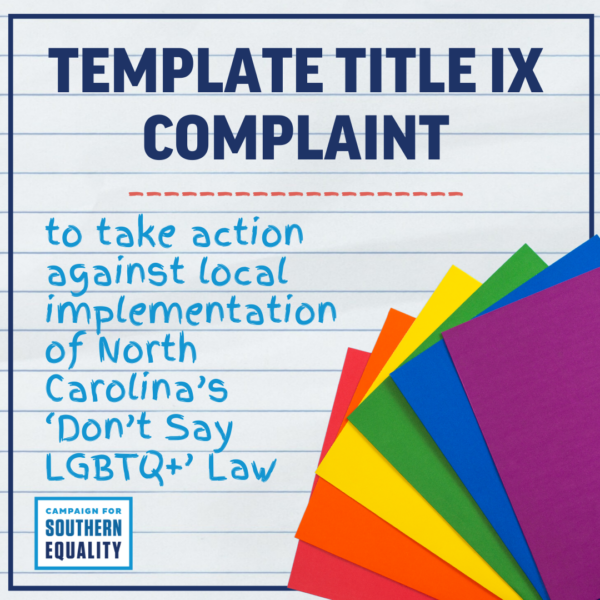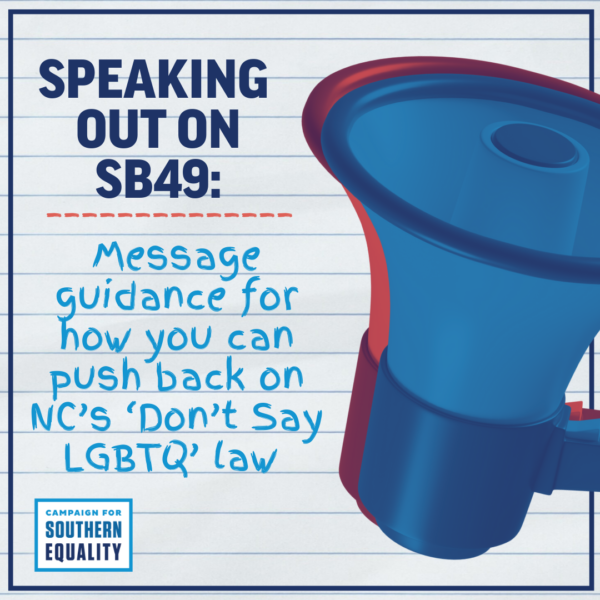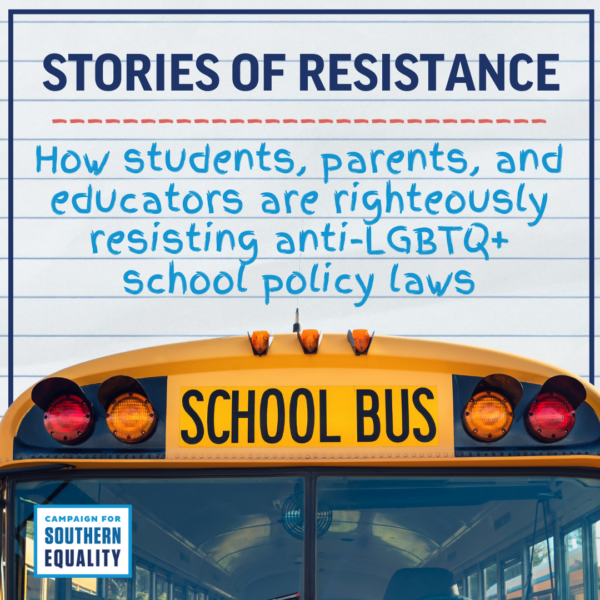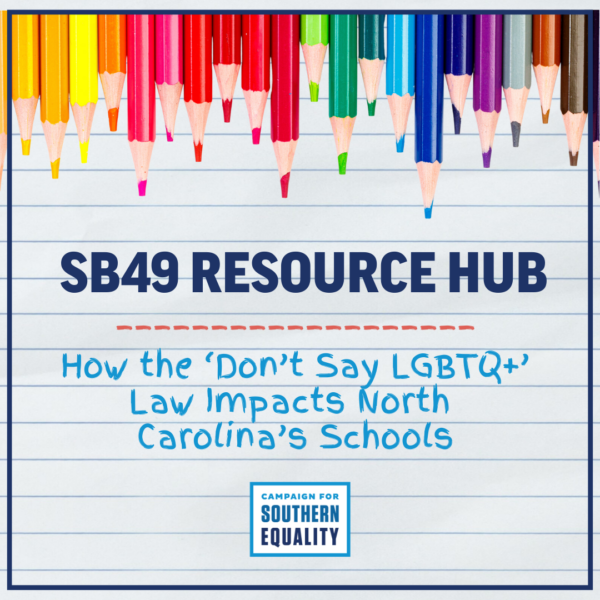
Senate Bill 49, also known as North Carolina’s “Don’t Say LGBTQ+” bill, was enacted in August 2023 following the NCGA’s override of Governor Roy Cooper’s veto. The anti-LGBTQ+ curriculum censorship and school policy law is a cruel attack on LGBTQ+ students and educators. Its implementation is currently being determined by individual school districts in North Carolina, and it’s up to all of us to push back, speak out, and take action against this shameful law.
This S.B. 49 resource hub compiles information about the law, why it is in stark violation of federal law, and how you can take action.
Note: This resource hub focuses on a North Carolina law. Please feel free to adapt these strategies to similar laws in your state. If we can support you in fighting anti-LGBTQ+ laws affecting students in your state, please reach out to the Supportive Schools team at CSE.
Navigate This Page:
➡️ SB49 Overview
➡️ What is allowed under SB49?
➡️ Federal Title IX Complaint Against NC
➡️ How communities are responding
➡️ What Are You Seeing in Your School?
➡️ Title IX Complaint Against Buncombe County Schools
➡️ Memo: How SB49 Violates Title IX
➡️ Take Action in Your School District
➡️ Template Materials
➡️ News Clips
➡️ Speakers Guide
➡️ Videos
➡️ Share Your Story
➡️ Stories of Resistance
➡️ Make A Donation
What is S.B. 49 and What is its Impact on North Carolina Schools?
S.B. 49 censors LGBTQ+ students themselves and LGBTQ-related school curriculum in several ways, including the following:
- Prohibiting the discussion of gender identity, sexual activity, or sexuality in Kindergarten-4th grade
- Requiring that schools create a process for parents to inspect and review all textbooks and instructional materials that will be used in their child’s school, as well as access their child’s records at the school library
- Requiring that school personnel notify parents about changes in the name or pronoun used for a student at school. This has been called the “forced outing” provision of the law.
The impact of S.B. 49 is already being felt in North Carolina. It is a disturbing attempt to take away two proven lifelines from LGBTQ+ students in North Carolina: supportive teachers & school materials/books that affirm their identity.
Want to learn more about S.B. 49? View this FAQ document compiled by Equality NC, Campaign for Southern Equality, and Planned Parenthood South Atlantic.
What is allowed under S.B.49? The impact of the settlement of Florida’s Don’t Say Gay law
S.B. 49 and other similar laws are based on Florida’s ‘Don’t Say Gay’ law, H.B. 1557, signed into law by Governor Ron DeSantis in March 2022. The language of these bills is deliberately vague, leaving educators and districts confused and unsure about what the laws require.
In March 2024, civil rights attorneys from Equality Florida, NCLR, and Family Equality reached a settlement with the State of Florida, clarifying and limiting the law’s requirements. Key elements of the settlement include:
Educational materials and classroom ‘instruction’
- Students and teachers can speak and write freely about sexual orientation and gender identity in classroom participation and assignments.
- Teachers can respond to students who choose to discuss their own families or identities and can grade essays that include LGBTQ topics.
- Teachers can make reference to LGBTQ people in literature or history.
- The law also does not apply to books with incidental references to LGBTQ+ characters or same-sex couples, “as they are not instruction on sexual orientation or gender identity any more than a math problem asking students to add bushels of apples is instruction on apple farming”,
- The law cannot ban library books with LGBTQ topics not being used for instruction in the classroom.
- The law cannot prohibit references to LGBTQ+ individuals, relationships, families, or topics in any educational or extracurricular context.
- The law is neutral – meaning what applies to LGBTQ+ people also applies to heterosexual and cisgender people.
School safety and protection from bullying
- The settlement reinforces safeguards against bullying based on sexual orientation and gender identity.
- Schools can explicitly protect LGBTQ students in anti-bullying efforts, and teachers can have “safe space” stickers in their classroom.
- Targeting LGBTQ+ persons, couples, families, or issues under the guise of this law is explicitly forbidden.
Students’ rights to free speech and expression
- Student-to-student speech and classroom debates can touch on LGBTQ issues.
- Students of the same gender can dance together at school dances and wear clothing considered inconsistent with their gender assigned at birth.
- Participation in and support of LGBTQ+ student clubs and cultural presentations remain unaffected.
- Schools cannot prohibit participation in extracurricular activities (such as ‘Gender and Sexuality Alliances’ or book fairs)” or “after-hours tutoring.”
- GSAs are officially protected, providing students with essential support and advocacy spaces.
The settlement agreement can be found here. It is not legally binding outside of Florida, but it provides the clearest interpretation of these laws, to date. Students, families and educators challenging overcompliance with S.B.49 in North Carolina schools can refer to the Florida settlement, and ask their district to provide legal justification for its actions and interpretations, when Gov. DeSantis’ attorneys could not.
Federal Title IX Complaint Against the NC State Board of Education and the NC Department of Public Instruction
In January 2024 the Campaign for Southern Equality filed a Title IX complaint with the U.S. Department of Education and U.S. Department of Justice against the North Carolina State Board of Education (SBE) and the North Carolina Department of Public Instruction (DPI). The complaint alleges that North Carolina’s public schools are systematically marginalizing lesbian, gay, bisexual, transgender, and queer (LGBTQ) students. In doing so, they violate civil rights protected by Title IX of the Education Amendments Act of 1972 and North Carolina schools’ obligation to provide every student with a safe school environment free from discrimination.
The complaint is based on information provided by over 100 individuals reporting on the consequences of S.B. 49 through testimony to school boards, an online submission form, email communications, and personal interviews. Of these, 24 individuals – including parents, students, educators, administrators, and school board members, agreed to be quoted directly and consented to speak with OCR investigators upon request.
Investigation of the complaint is currently pending.
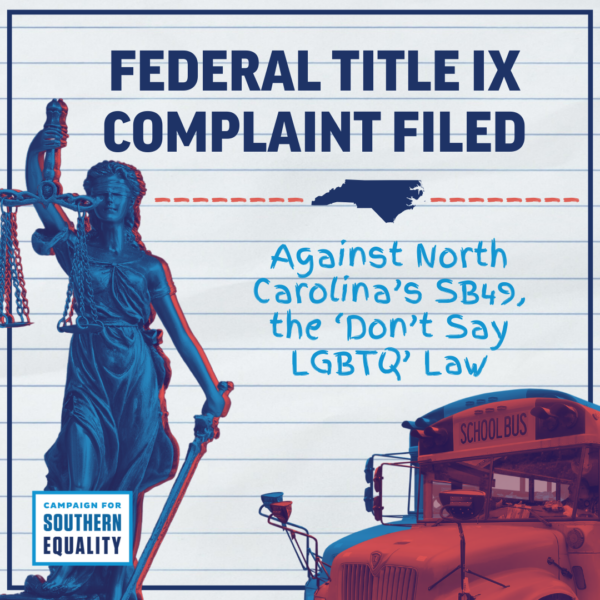
S.B.49: How students, parents and educators are responding
During the 2023-24 school year, the Supportive Schools team has learned about a wide range of grassroots responses by students, parents, and educators across North Carolina.
Students are using their freedom of speech and freedom of expression.
While SB49 is binding on school staff and faculty, students still retain their full rights to freedom of speech. So a student who has to do a book report may choose to read and report on a book that has been banned. A student who has to do a social studies report may choose to research non-binary gender identities in different cultures. For a history project, a student may choose to research an LGBTQ+ historical figure.
Students also retain their right to self expression. Changes in pronouns must be reported to parents, but students have many other ways to express themselves and who they are. The more that schools try to crack down on that expression (banning rainbows, pride flags, pronoun buttons, and more) the more creative students are becoming, and the more non-LGBTQ+ students are getting involved in protecting students’ rights.
Staff and faculty are engaging in non-compliance and civil disobedience.
When SB49 was first passed, there was a great deal of concern among educators. After a year, however, teachers, counselors, social workers, and media specialists, as well as many administrators, have realized that there are few enforcement provisions in place, and many are simply ignoring provisions like reporting students for changing their pronouns. If they are challenged for these choices, they respond by invoking their professional ethics or their obligations under Title IX, all of which forbid them from discriminating against LGBTQ+ students.
Parents and families are stepping up
A large majority of parents, guardians and other family members are frustrated with how public schools have been drawn into the culture wars. Across the state, parent groups are organizing to oppose book bans, support LGBTQ+ friendly school clubs and youth programs, and counter disinformation and stereotypes about queer and trans youth. Parents are also volunteering to join Media and Technology Advisory Committees, which make decisions about banning books; taking leadership roles in Parent-Teacher Associations; speaking up at school board meetings; supporting school board candidates who believe that all students should be safe and welcome at school; and even running for the school board themselves.
Could you please put that in writing?
Of course, these efforts are not always well received by administrators who want to discriminate against LGBTQ+ students, and who may threaten punishment or consequences. Students, parents, and teachers alike have learned to use the ‘magic words.’ If an administrator says something is not allowed: “Could you please show me that policy?” If an administrator threatens punishment or consequences: “Could you please put that in writing?” If an administrator cannot show a policy or is not willing to put a decision in writing, then the student, parent or faculty member is not required to comply. If they do provide a written response, then they have provided documentation that may be used in a civil rights complaint.
Filing Title IX complaints
In addition to CSE’s federal Title IX complaint against the state of North Carolina, a number of parents and community groups have filed civil rights complaints against their school districts for complying with SB49. Most commonly, these have involved book bans that target LGBTQ+ content, and school policies that create a ‘hostile educational environment’ for LGBTQ+ students. Complaints have been filed both with district-level Title IX Coordinators as well as with the federal Office of Civil Rights. In other cases, a formal complaint has not been necessary, and problems have been resolved just by meeting with the principal, superintendent or Title IX Coordinator. Please visit our Civil Rights Complaint resource page for more information and to see sample complaints.
What are you seeing in your school?
The Supportive Schools team at CSE would love to hear your stories, about how students, families and faculty are standing up for justice. And if we can support your efforts, we hope you’ll let us know that as well.
Contact UsTitle IX Complaint Filed Against Buncombe County Schools
In December 2023, Youth OUTright, PFLAG Asheville, and Campaign for Southern Equality filed a Title IX complaint against the Buncombe County Board of Education (BCBE). The complaint alleges that the policies passed by BCBE to comply with state law S.B. 49, NC’s version of the “Don’t Say LGBTQ+” law, create a hostile educational environment for LGBTQIA+ students, families, staff and faculty. In doing so, they violate civil rights protected by Title IX and Buncombe County Schools’ obligation to provide every student with a safe and non-discriminatory school environment.
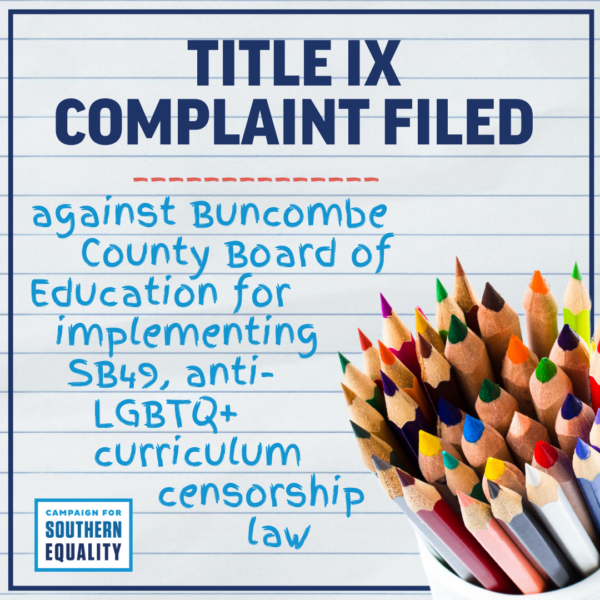
Memo: How S.B. 49 Violates Title IX
In October 2023 the Campaign for Southern Equality published a legal memorandum about S.B. 49. The memo highlights the many ways S.B. 49 creates a hostile educational environment for LGBTQ+ students. In doing so, S.B. 49 violates Title IX of the Education Amendments of 1972, a federal law that bars discrimination based on sexual orientation and gender identity in schools.
The memo, which has been shared with the General Counsel of the North Carolina Department of Public Instruction and local Boards of Education, explains how school districts cannot both follow S.B. 49 and remain in compliance with Title IX. As a result, the Campaign for Southern Equality recommends that compliance with S.B. 49 be postponed or suspended until the Department of Public Instruction has had a chance to address the Title IX issues prompted by S.B. 49.
Take Action in Your School District
Have you experienced discrimination in your school? You have a right to file a civil rights complaint with the federal government. Click the button below for more information.
Learn How to File A Title IX ComplaintTemplate for Title IX Complaint
If your school or school district has passed policies to comply with SB49, and you feel those policies discriminate against LGBTQ+ students, you can file a Title IX complaint with the Title IX Coordinator. The template provided here was used in Buncombe County. It draws on public comment and email messages sent to the Board of Education as testimony. It asks the Title IX Coordinator to delay implementation of the policies until a state-level Title IX complaint can be resolved.
- Look up the Title IX Coordinator for your school or school district. Their name and email address should be on the school’s website.
- Revise this template by replacing the BOLD CAPS with the appropriate names or information.
- Feel free to edit the complaint to fit your school or situation.
- Send it to the Title IX Coordinator, and attach the CSE Memo to DPI as your legal evidence.
- They are required to investigate and provide a written response with their findings.
- Please feel free to send us questions or let us know how it’s going using the form on this page.
Model Notice of SB49 Non-Compliance
This letter may be used by North Carolina school staff and faculty to notify your principal or superintendent that you refuse to comply with policies based on SB 49 that create a hostile educational environment for students. Be sure to attach the “Campaign for Southern Equality Memo” to the Department of Public Instruction as your legal evidence. The letter may be revised from “we” to “I” if a single staff or faculty member signs.
Model Title IX Complaint
This model Title IX complaint can be used by parents, students, or educators who have
concerns about actions their school or district has taken to comply with SB49. Be sure to include the “Campaign for Southern Equality Memo” for your legal evidence.
Your school policies should include information about who the Title IX Coordinator is, and how to submit the complaint. The Coordinator should investigate the allegation and provide you with a response in writing. If you are not satisfied with the response, you can appeal the decision to the Office of Civil Rights at the US Department of Education.
News Stories About S.B. 49
- NBC News (ASHEVILLE): LGBTQ students reflect on first school year under North Carolina’s ‘Don’t Say Gay’ law • June 18, 2024
- Charlotte Observer (CHARLOTTE) Charlotte-Mecklenburg Schools changes e-book app over ‘Parents’ Bill of Rights’ concerns • March 21, 2024
- EdNC (ASHEVILLE) New legislation creates fear for some students, but LGBTQ+ school clubs provide community, advocates say • March 11, 2024
- Associated Press (CHAPEL HILL): North Carolina school board backs away from law on policies on pronouns, gender identity instruction• January 19, 2024
- The News & Observer (RALEIGH): LGBTQ rights group says NC’s new Parents’ Bill of Rights violates federal law • October 10, 2023
- Fox 8 (GREENSBORO): North Carolina’s new Parents’ Bill of Rights law could violate Title IX, Campaign for Southern Equality says • October 11, 2023
- Asheville Citizen-Times (ASHEVILLE): Asheville City Schools parents on SB49: Violation of federal Title IX • October 10, 2023
- The News & Observer (JOHNSTON COUNTY): Johnston’s rules on school library books could go beyond what new state law requires • October 12, 2023
- Mountain XPress News (ASHEVILLE): Asheville school board considers policy changes to comply with state Parents’ Bill of Rights • October 10, 2023
- Winston-Salem Journal (WINSTON-SALEM): School district task force studying controversial law on parents’ rights, including use of pronouns, preferred names • October 12, 2023
- WLOS (ASHEVILLE): Asheville City Schools leaders worry about complying with Title IX and Parents’ Bill of Rights • October 12, 2023
Speaker’s Guide About SB49
Want to speak out against SB49 in your community? It can be confusing to wrap your head around all of the harmful components of the law – so take a look at this SB49 Speaker’s Guide to get yourself prepared to speak about this at a School Board meeting, in the media, or in one-on-one conversations in your life.
Videos: Speaking Out Against S.B. 49 at Asheville City School Board Meeting
At the October 9, 2023 meeting of the Asheville City Schools Board of Education, team members from the Campaign for Southern Equality spoke against S.B. 49, shared details of our legal memo that highlights why S.B. 49 violates Title IX, and urged the Board to press pause on implementing the harmful law.
Craig White
Allison Scott
Jasmine Beach-Ferrara
Report an Incident or Share How S.B. 49 is Impacting You:
Have you seen S.B. 49 or other anti-LGBTQ+ activities implemented in your school? Or do you want to share how you worry about S.B. 49 impacting your life in North Carolina? Please use this form below to share your story.
Blog Post: Stories of Resistance
Now that North Carolina has joined Florida and Alabama in passing broad anti-LGBTQ+ youth policy bills, known as the so-called “Don’t Say LGBTQ+” policies, we’re getting more questions than ever about how parents, teachers, and families can act.
Working with the Supportive Schools team at the Campaign for Southern Equality, we have access to things that don’t make the news, as well as stories and rumors. In a September 2023 blog post, our team shares stories that we’ve heard in our work, as well as stories that have made the news, of how LGBTQ+ and allied students, teachers, parents, and educators are rising up against anti-LGBTQ+ education policies.
Make a Donation
The Campaign for Southern Equality is working to resist oppressive legislation, including S.B. 49 in North Carolina, and support families grappling with the barrage of anti-LGBTQ+ legislation that has passed in recent years. Your donation helps fuels our work.
Donate to CSE
